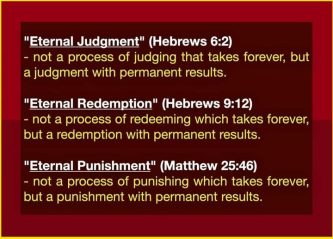EVERLASTING PUNISHMENT IS TRUE – ENDLESS TORMENT IS NOT
Everlasting punishment is true; endless torment is not. Destruction is the punishment – “who shall be punished with everlasting destruction” (2 Thessalonians 1:9).
It is punishment, not punishing. It is a noun, not a verb. It is the result, not the process. The result is destruction and that result is everlasting; the process of being destroyed is not.
It is an everlasting punishment. How long does the destruction last? It is ever-lasting. In a nutshell – the punishment is destruction, the destruction is everlasting – it is truly an everlasting punishment. I encourage you to reread this paragraph, slowly, carefully.
The book of Hebrews gives three other instances where aionion refers to the result and not the process, the end and not the means:
“And being made perfect, he became the author of eternal salvation unto all that obey him” (5:9)
“Of the doctrine… of resurrection from the dead, and of eternal judgment” (6:2).
“he entered in once into the holy place, having obtained eternal redemption for us” (9:12)
It is eternal salvation, not eternal saving; eternal judgment, not eternal judging; eternal redemption, not eternal redeeming.
And it is everlasting punishment, not everlasting punishing; everlasting destruction, not everlasting destroying.
Each of these has a limited duration as to process (how long it takes), but an unlimited extent as to the end result (how long it lasts).
The process of redemption was in what Christ once obtained, but the result of redemption is eternal, therefore it is truly eternal redemption.
Here scripture gives us such a clear example of a finished process with an everlasting result: “Once…obtained” – past tense, completed, done – but an eternal result. It didn’t take long but it lasts forever.
Similarly the process of the judgment (the judging) is not everlasting, but the result is (the judgment). The destruction is everlasting, not the process of destroying.
Bro Bird

